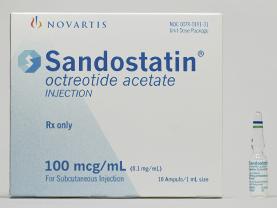Octreotide Interactions
There are 167 drugs known to interact with octreotide, along with 7 disease interactions, and 1 alcohol/food interaction. Of the total drug interactions, 6 are major, 149 are moderate, and 12 are minor.
- View all 167 medications that may interact with octreotide
- View octreotide alcohol/food interactions (1)
- View octreotide disease interactions (7)
Most frequently checked interactions
View interaction reports for octreotide and the medicines listed below.
- Acetylsalicylic Acid (aspirin)
- Adrenalin (epinephrine)
- Aldactone (spironolactone)
- Ativan (lorazepam)
- Augmentin (amoxicillin / clavulanate)
- Benadryl (diphenhydramine)
- Cipro (ciprofloxacin)
- Claritin (loratadine)
- Creon (pancrelipase)
- Cymbalta (duloxetine)
- Dextrose (glucose)
- Dilaudid (hydromorphone)
- Keppra (levetiracetam)
- Lasix (furosemide)
- Lomotil (atropine / diphenoxylate)
- Lovenox (enoxaparin)
- Mestinon (pyridostigmine)
- Metoprolol Tartrate (metoprolol)
- MiraLAX (polyethylene glycol 3350)
- Paracetamol (acetaminophen)
- Plavix (clopidogrel)
- Protonix (pantoprazole)
- Synthroid (levothyroxine)
- Tylenol (acetaminophen)
- Vitamin B12 (cyanocobalamin)
- Vitamin C (ascorbic acid)
- Vitamin D3 (cholecalciferol)
- Vitamin K (phytonadione)
- Zofran (ondansetron)
- Zyrtec (cetirizine)
Octreotide alcohol/food interactions
There is 1 alcohol/food interaction with octreotide.
Octreotide disease interactions
There are 7 disease interactions with octreotide which include:
- renal dysfunction
- gallbladder/biliary dysfunction
- glucose intolerance
- heart disease
- hepatic impairment
- thyroid dysfunction
- vitamin B12 deficiency
More about octreotide
- octreotide consumer information
- Compare alternatives
- Pricing & coupons
- Reviews (19)
- Latest FDA alerts (1)
- Side effects
- Dosage information
- During pregnancy
- Drug class: somatostatin and somatostatin analogs
- Breastfeeding
- En español
Related treatment guides
Drug Interaction Classification
| Highly clinically significant. Avoid combinations; the risk of the interaction outweighs the benefit. | |
| Moderately clinically significant. Usually avoid combinations; use it only under special circumstances. | |
| Minimally clinically significant. Minimize risk; assess risk and consider an alternative drug, take steps to circumvent the interaction risk and/or institute a monitoring plan. | |
| No interaction information available. |
See also:
Further information
Always consult your healthcare provider to ensure the information displayed on this page applies to your personal circumstances.


